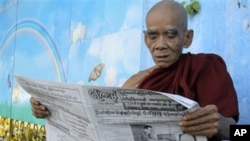The government of Burma is moving again to ease what were once among the world’s tightest media controls by ending censorship of private publications. The Press Scrutiny and Registration Department said August 20 it would no longer require journalists to submit their work to state censors before publication. Media groups hailed the move, made after consulting the United Nations Educational, Scientific and Cultural Organization, calling it a significant step forward for press freedom.
Burma has kept tight control over all aspects of the media for almost 50 years. As the civilian government has made positive changes over the last year toward democratic rule and greater political freedoms for its citizens, it increasingly recognizes that press freedoms are a necessary part of this process.
Developments toward reform in Burma remain fragile, however. Hundreds of individuals remain imprisoned for political activism, human rights violations continue violence rages in ethnic areas. Even with the easing of press controls, state officials will continue to review what is written and many laws remain on the books under which journalists can be punished for writing material which angers or offends the government.
The United States will continue to press for further progress in democratization, a halt to hostilities in ethnic minority areas and the unconditional release of political prisoners. That said, we are encouraged by the people of Burma’s work toward a peaceful, just and free nation, and we support their efforts.
Burma has kept tight control over all aspects of the media for almost 50 years. As the civilian government has made positive changes over the last year toward democratic rule and greater political freedoms for its citizens, it increasingly recognizes that press freedoms are a necessary part of this process.
Developments toward reform in Burma remain fragile, however. Hundreds of individuals remain imprisoned for political activism, human rights violations continue violence rages in ethnic areas. Even with the easing of press controls, state officials will continue to review what is written and many laws remain on the books under which journalists can be punished for writing material which angers or offends the government.
The United States will continue to press for further progress in democratization, a halt to hostilities in ethnic minority areas and the unconditional release of political prisoners. That said, we are encouraged by the people of Burma’s work toward a peaceful, just and free nation, and we support their efforts.




